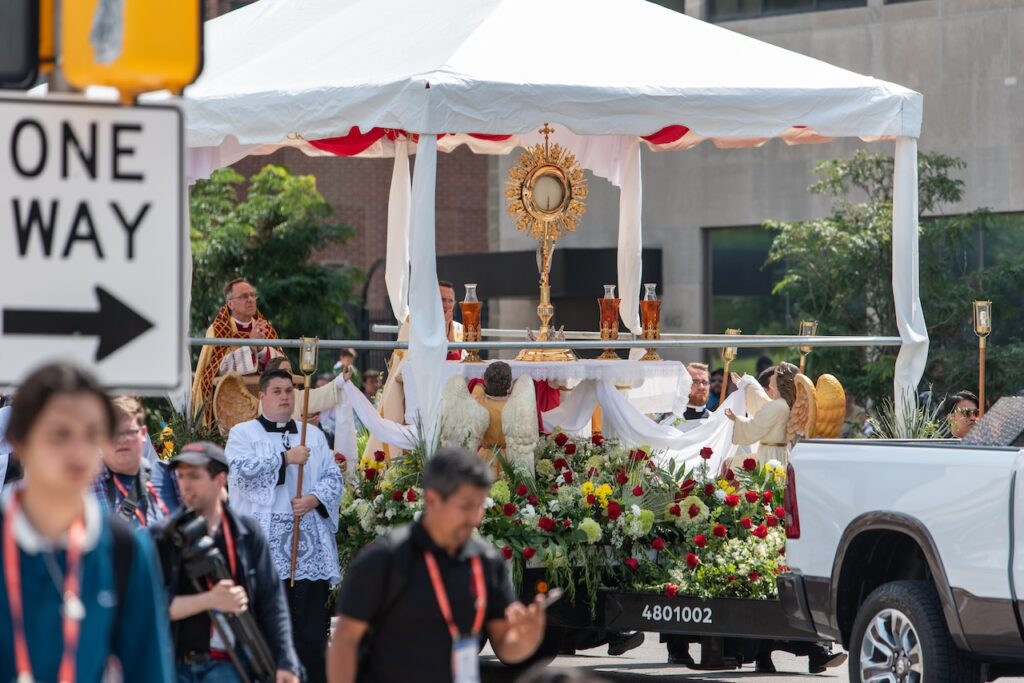As the Holy Eucharist melted on the roof of my mouth the morning of July 21, I knew I was experiencing a foretaste of heaven.
All week, when I had the chance to speak with a National Eucharistic Congress guest speaker like Father Mike Schmitz, I’d led with the same question: “You’re here with a job to do, as are we in the media. But what are you hoping to get out of this congress in your personal spiritual life?”
Perhaps I was keen to ask the question because I didn’t know the answer for myself.
As I found my way back from the low-gluten Communion station to the media platform, I had my answer. Union with God is what we crave – not just at a papal Mass, not just on Sunday, but every moment of our lives. And this was as close as I had been in a very long time.
On the way into Lucas Oil Stadium that morning, I’d found a priest to walk alongside, and I’d made my confession. The night before, I’d written my last on-the-ground story for The Catholic Virginian. And during Luis Antonio Cardinal Tagle’s homily, I’d made my final notes for the week.
There was nothing to do now but to savor the taste of the body of Christ as it dissolved on my tongue.
The Indianapolis Symphony Orchestra played “Sweet Sacrament,” a hymn by Frederick William Faber, then “Ave verum corpus,” by Mozart. Rather than return to my perch on the platform, I stayed for a moment on the floor, found a quiet spot to stand, and I prayed.
I could feel the joy of 60,000 other Catholics singing beside me, the blessings from Rome bestowed by the cardinal, the love of God filling the room. I had a sense of deep union with the whole congregation; I experienced myself as one small part of the universal, timeless body of Christ.
As I continued to pray, a wave of gratitude rose in my heart and spilled out. Psalm 51 says, “Cleanse me with hyssop, that I may be pure; wash me, and I will be whiter than snow.”
I understood – the souls of all the faithful in that building, of all the people in the world, were created by God, infinitely perfect and blessed in himself, to make us share in his own blessed life.
Only sin muddies those clear, glassy waters, closes that window between God and man. Here, having made my confession, having taken Communion in a state of grace, I was free.
I began to thank God with my mind, heart and soul. I thanked him for my family, who raised me in the Catholic faith. I thanked him for the conversion of my mother, confirmed in January. I thanked him for leading me, years ago, to the beautiful and upright woman waiting for me in Richmond. I thanked him for carrying me home from Spain in time to interview for The Catholic Virginian.
“Esto nobis praegustatum,” or “Be for us a foretaste [of heaven],” the angelic voices sang. I thanked God that I heard the music, that I saw the crowds, that I felt the ground beneath my feet.
As anyone who has attended a spiritual retreat well knows, the challenge is often taking the sublime moments from these events back home. Before I returned to the outside world, I tried to find a place in my heart to rest, a place I could come back to whenever I wanted. So far, I have not forgotten the path there – but to make sure I don’t lose it, I will have to continue to walk it.
I will be joined in this endeavor by 60,000 others, and millions more who prayed with us and made the pilgrimage with us in their own way. Thousands of priests, hundreds of bishops, many cardinals, and the laity are all taking their experiences back with them to their home parishes.
Each of us has a special mission not to hide the Light of the World, but to let it shine before others. To do this, we must stay focused on the love and glory of God, and the grace he gives freely to us as his body, blood, soul and divinity in the species of bread and wine.
This was the faith of the Apostles, handed down to us. When we remember the saints and the martyrs who died for it, let us not be afraid to proclaim it in our lives, as Cardinal Tagle said, “joyously and zealously for the life of the world.”
Read more about the National Eucharistic Congress.

